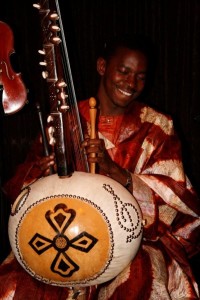Here is our calendar of events for Feb. 2013. Download calendar here.

Karamo Susso and Legends of the Kora
“Was that a mandolin? Maybe a classical guitar?” If you’re not familiar with Karamo Susso’s music, you might not be able to identify that uniquely West African string instrument sitting on his lap. The kora is a 21 stringed instrument whose body is fashioned out of a calabash, a type of gourd, which produces it’s twangy resonance. The kora produces a sound that is delicate and intricate like a harp, but also plucky and folksy like a banjo. It is a storied instrument whose origins have been chronicled by generations of griots, the West African storytellers and oral historians, every region telling a different tale.

In legends from Mali, the kora was discovered by Tiramaghan a general of Sundiata, who fell in love with the instrument’s music. He stole the kora from a genius-woman of Kansala and presented it to the griot of his own community. Tradition from Guinea states that a griot named Mady Fouling Cissoko visited a mystical lake while on a visit with the king. He hoped to find a genius at the lake who could grant him three wishes. When he found the genius, he wished for an instrument that no griot had ever seen, offering his sister in exchange. According to legend, the genius told Cissoko, “Foly feng kora” which translates in Maninka to “new and recent, play it” and the kora became an essential part of storytelling in Guinea.

Karamo Susso grew up amongst the griots of his community in Mali and began playing the kora before he was even big enough to hold it up by himself. He learned from griots in his own community and family, who also happened to be legendary kora players like his uncle Ballake Sissoko and his neighbor Toumani Diabete. He has since become an internationally renowned player playing throughout West Africa, teaching at the Institute Nationale des Artes in Bamako, Mali and playing in the US at university lecture halls and clubs with fellow world music stars, jazz and hip hop artists. He is a precise master of the instrument and leaves audiences in awe of his intricate and elegant playing.
Join us at La Peña for his show on Saturday January 26th for some legendary West African stories, and of course, the beautiful sound of the kora.
Feature Activist – December 2012
Feature Activist
La Peña highlights the effort of 67 Sueños to give migrant youth a brighter vision in the Bay Area and in the Country. We support their “goal of raising the voices of migrant youth to expand the debates and the legislative possibilities,” and their use of art to generate a dialogue that promotes a positive message on immigration. 67 Sueños has demonstrated consistently, with their work, that they are dedicated to raising the voices of the undocumented youth so that they are heard at a national level.
67 Sueños Mission
“The 67 Sueños project was born out of the recognition that the majority of migrant youth were not being included in the debates about OUR future that were and are happening nationally. Our goal is to raise those/our underprivileged migrant youth voices to expand the debate and the legislative possibilities.”
For more information on 67 Sueños visit www.67suenos.org
Follow them in Facebook and follow them on Twitter
- « Previous Page
- 1
- …
- 64
- 65
- 66
- 67
- 68
- …
- 128
- Next Page »
